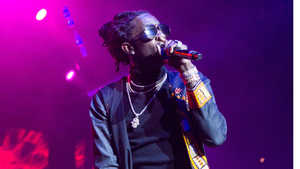The judge overseeing the ongoing criminal case involving Young Thug has ruled that prosecutors will be able to use some of the rapper's lyrics when the proceedings get to trial later this month, albeit on a conditional basis.
Judge Ural Glanville will allow seventeen sets of lyrics from songs performed by Young Thug - real name Jeffery Williams - and other co-defendants in the case to be presented as evidence in court. Albeit "depending upon - or subject to - a foundation that is properly laid by the state or the proponent that seeks to admit that evidence".
Williams was charged in the US state of Georgia in May last year - alongside fellow rapper Gunna and 26 others - with numerous counts of racketeering.
Prosecutors allege that the rapper co-founded a gang that went on to commit murders, shootings and carjackings, which he then bragged about in his tracks and music videos. The case against Williams and five others will get to court at the end of this month.
The use of lyrics - usually rap lyrics - in criminal cases has become increasingly controversial in recent years. It is argued that using a defendants creative output as evidence in court breaches that person's freedom of expression.
Concerns have also been expressed that juries are prone to assume that rap lyrics in particular are more rooted in reality when, of course, any events they describe may be exaggerated or entirely made up.
New rules were introduced in the state of California last year restricting the use of lyrics in criminal trials and there have been calls from the music industry for similar restrictions to be put in place across the US. Warner Music divisions Atlantic Records and 300 Entertainment, which work with Young Thug and Gunna, have been particularly vocal on this issue.
Williams' legal rep Brian Steel obviously raised all of the concerns around the use of lyrics as evidence before Glanville made his ruling. He also pointed out that Williams doesn't even write all of the lyrics he performs. But the judge was not persuaded by those arguments.
According to AP, the prosecution countered that free speech protections under the First Amendment of the US Constitution did not apply because the defendants are not be prosecuted for their lyrics. The rapped lines, they added, prove the existence of William's gang, the behaviour of gang members and William's status as gang leader, meaning that they "are party admissions" that "happen to come in the form of lyrics".

